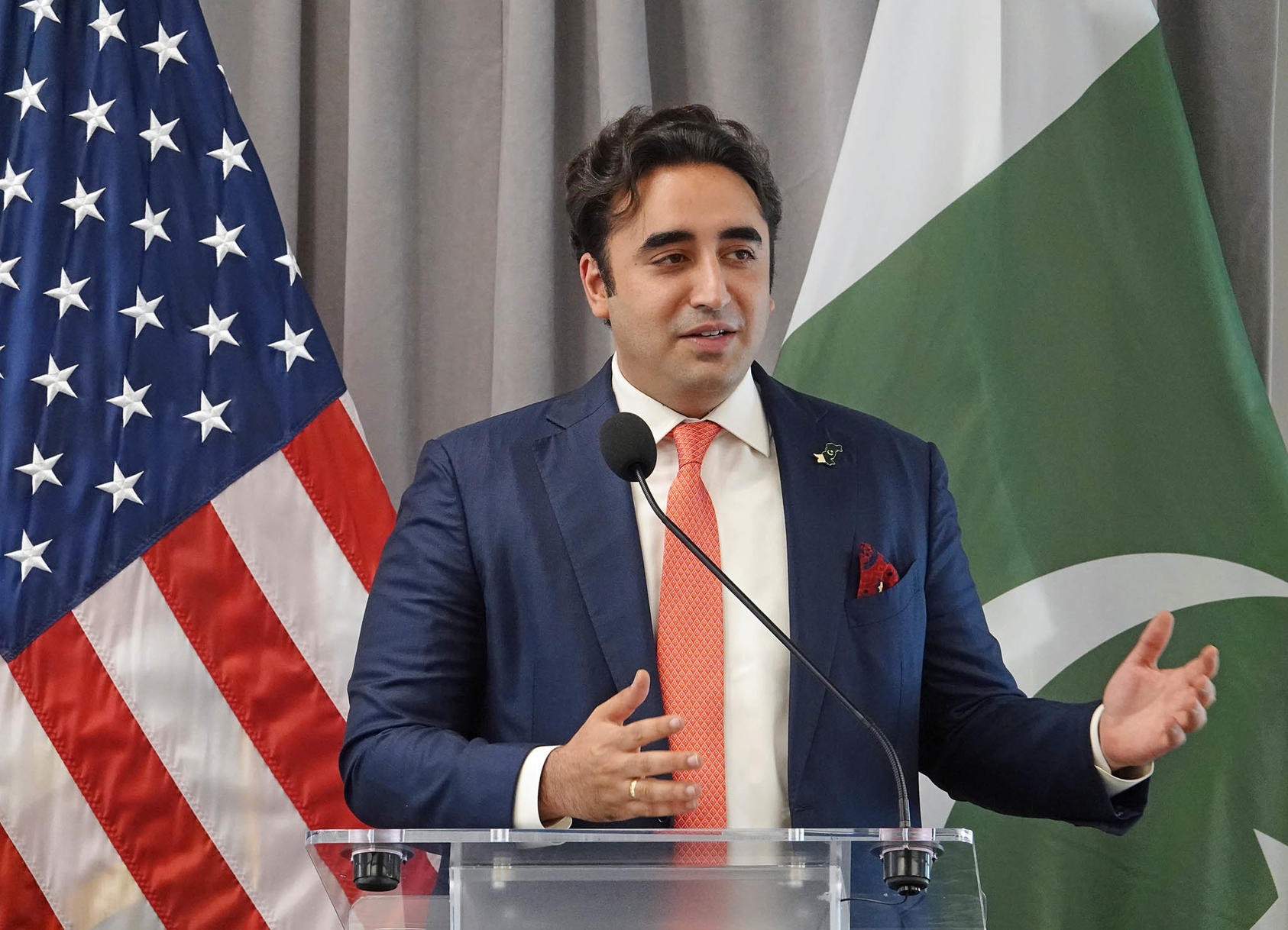
Pakistani Foreign Minister, Bilawal Bhutto Zardari, speaks to U.S. officials and policy experts at USIP, urging support for a global response to his country’s flood that can build a system to help developing countries most vulnerable to climate disasters—credit USIP.org
by Shah Khalid 26 September 2023
Introduction
Climate change remains one of the most pressing global challenges of our time. Its far-reaching consequences are increasingly evident, affecting ecosystems, economies, and societies worldwide. While no country is immune to its impacts, developing nations, like Pakistan, are particularly vulnerable. This article delves into the adverse impact of climate change and the vital role major global powers must play in assisting the most affected countries, including Pakistan, in mitigating and adapting to its effects.
The Global Challenge of Climate Change
Climate change, driven by human activities such as burning fossil fuels, deforestation, and industrial processes, is altering the Earth’s climate system. Rising global temperatures, extreme weather events, sea-level rise, and disruptions to ecosystems are just a few of its myriad effects. These consequences do not discriminate; they affect nations across the globe. However, developing countries bear a disproportionate burden, despite contributing minimally to greenhouse gas emissions.
According to the Intergovernmental Panel on Climate Change (IPCC), developing nations face greater risks due to limited adaptive capacity, less resilient infrastructure, and socio-economic vulnerabilities. Those who have done the least to cause climate change are often the hardest hit by its repercussions.
Pakistan’s Vulnerability to Climate Change
Pakistan, located in South Asia, is highly susceptible to the impacts of climate change due to its unique geographical and environmental characteristics. The country faces various climate-induced challenges, including melting glaciers in the Himalayas, erratic monsoon patterns, frequent droughts, and devastating floods.
In recent years, Pakistan has experienced numerous climate-related disasters that have taken a toll on both lives and livelihoods. The 2010 floods, one of the worst disasters in Pakistan’s history, affected over 20 million people and resulted in massive economic losses. Agriculture, a crucial sector for the country’s food security and economy, has been hit hard by changing precipitation patterns and increased temperatures.
The Role of Major Players in Mitigating Climate Change
Addressing climate change requires a coordinated global effort, with major players and top emitters taking the lead. The United States, China, the European Union, and other industrialized nations bear a significant responsibility, as they account for a substantial share of global greenhouse gas emissions. International climate agreements like the Paris Agreement have set the stage for collective action to combat climate change.
However, the moral and ethical responsibility of these major powers extends beyond emission reduction targets. It includes providing financial and technological assistance to vulnerable countries grappling with the consequences of climate change.
Climate Assistance Initiatives
Several climate assistance initiatives and projects have been undertaken by the international community to assist developing nations. These efforts aim to support countries in reducing emissions, building resilience, and transitioning to sustainable development pathways. Examples include the Green Climate Fund, which mobilizes funds for climate projects in developing nations, and initiatives like the World Bank’s Climate Investment Funds.
While these initiatives represent crucial steps forward, they face challenges such as insufficient funding, complex administrative procedures, and bureaucratic delays. Moreover, the scope of these efforts often falls short of meeting the urgent needs of vulnerable countries.
The Way Forward: A Call for Enhanced Climate Assistance
To effectively combat climate change and assist the most affected nations, major global powers must step up their efforts. This includes increasing financial aid, technology transfer, and capacity-building support to enable developing countries to adapt and mitigate the impacts of climate change.
Financial assistance is particularly critical for nations like Pakistan, where climate-induced disasters strain already limited resources. Investments in sustainable infrastructure, renewable energy, and climate-resilient agriculture can significantly enhance a country’s ability to cope with climate change.
Furthermore, policy changes and sustainable practices within major economies are essential. Transitioning to cleaner energy sources, implementing stricter emissions controls, and incentivizing green technologies are steps that major emitters must take to reduce their carbon footprint.
Global solidarity and cooperation are paramount in addressing climate change comprehensively. The challenges posed by climate change transcend borders, and no single nation can solve them alone. Collaborative efforts, knowledge sharing, and technology transfer between nations are essential components of a successful global response.
Pakistan’s Efforts and Commitments
Pakistan has recognized the severity of the climate crisis and has taken steps to address it. The country’s Climate Change Policy outlines strategies for adaptation and mitigation, including afforestation projects, renewable energy expansion, and disaster preparedness measures. International partnerships, such as the Climate Adaptation Summit, provide platforms for Pakistan to seek support for its climate initiatives.
However, Pakistan’s capacity to address climate change remains limited without significant assistance from major global powers. Enhanced cooperation and support from these nations can amplify Pakistan’s efforts and contribute to a more sustainable and resilient future for the country.
Conclusion
The adverse impact of climate change is an urgent global crisis that requires collective action. Major global powers, responsible for a significant share of emissions, hold a moral responsibility to assist the most affected countries, including Pakistan. Financial aid, technology transfer, and policy changes within these nations are essential to support vulnerable countries in their efforts to combat climate change. Global solidarity and cooperation are central to addressing the climate crisis comprehensively. The time to act is now. Major powers must recognize their pivotal role in ensuring a sustainable future for all and take decisive steps to fulfill their moral obligation. Only through joint efforts can the world mitigate the adverse effects of climate change and build a more resilient and equitable world for future generations.
Shah Khalid is a Peshawar-based columnist focusing on power politics in South Asia.
